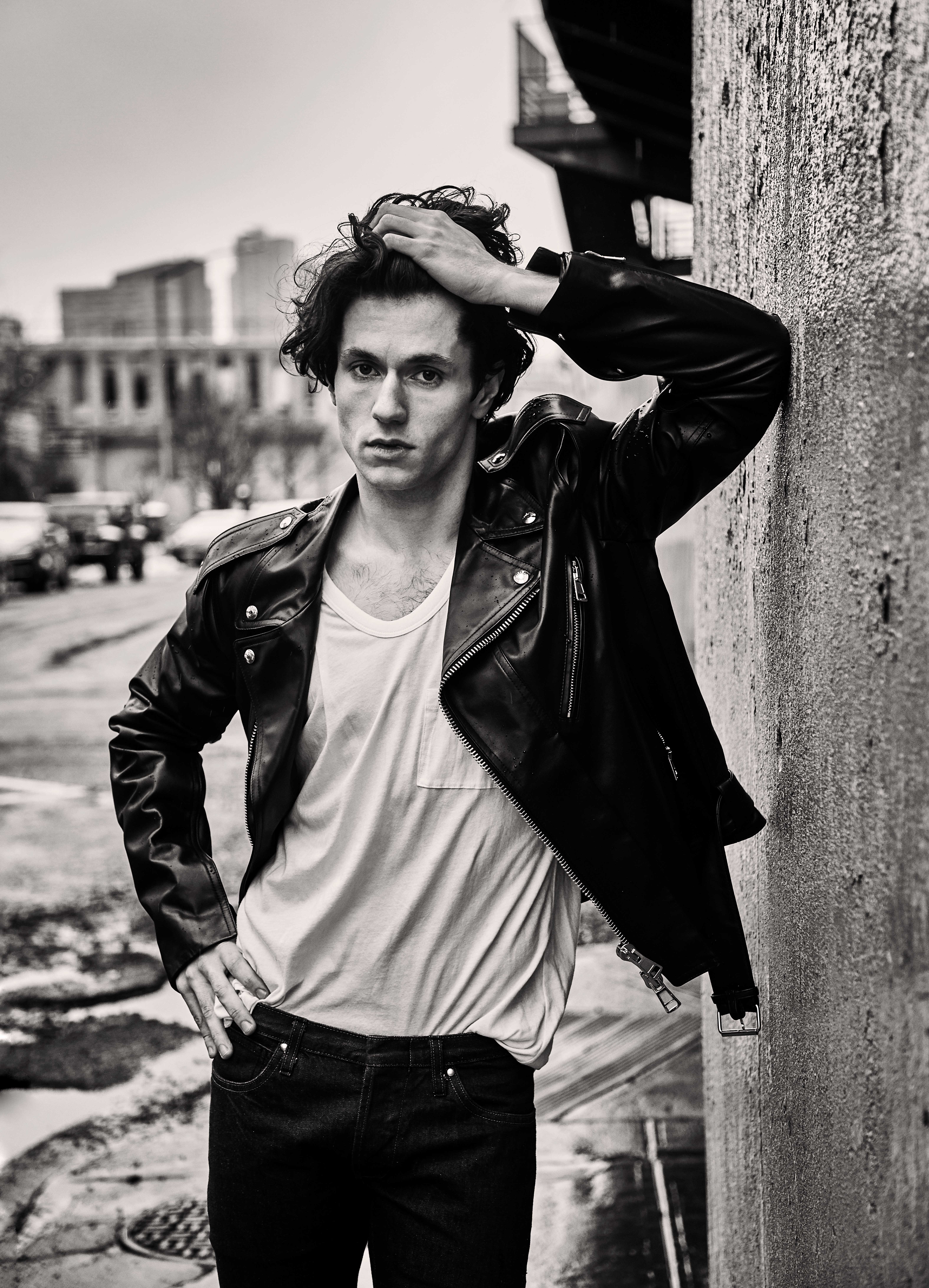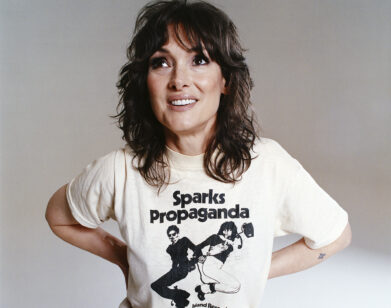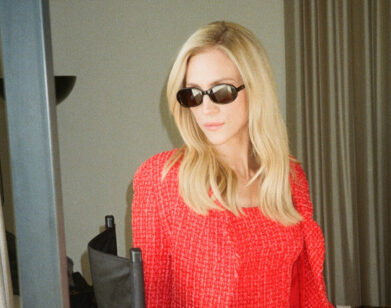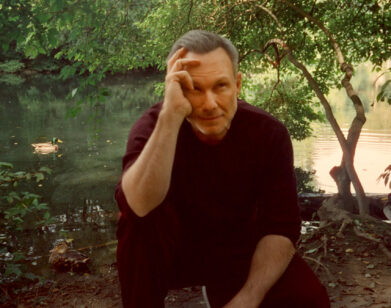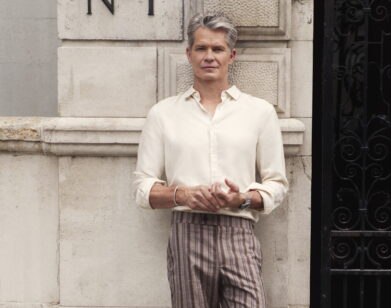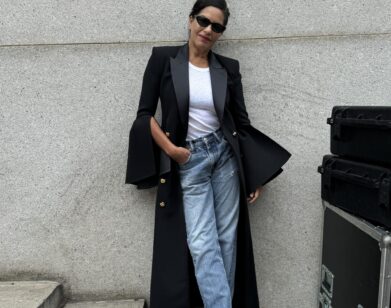James Scully, star of the new Heathers remake, awaits the dark promise of fame
Sometimes life imitates art. Take the unusual circumstances surrounding the new television series Heathers, a remake of the 1988 film starring Winona Ryder and Christian Slater. The pitch-black comedy about a clique of popular high school girls and one twisted new kid who enacts revenge upon them roiled the ’80s viewing public with its depictions of teen-on-teen violence and suicide. But for its brilliant writing (The line “Fuck me gently with a chainsaw” comes to mind), the film redefined the once-maudlin high school movie genre, and has become a cult classic.
When Paramount Network sought to remake it into a television series some 30 years later, they probably didn’t expect that real-world high schools would be almost as violent as the fictional Westerburg one. In fact, less than one month before the series was set to premiere, a shooting at Marjory Stoneman Douglas High School took 17 innocent lives. The Paramount execs decided to put the brakes on the show’s March 7th release, sensing it was too soon for a series that tackles gun violence—among many other social woes—with a big serving of camp. It’s now set to premiere early this summer.
While most of the major plot points are faithful to the source material, the new Heathers is different in other ways. For one thing, the trio of Heathers no longer conform to television’s cookie cutter standards of looking popular. They are plus-sized, nonwhite, and queer. While the 1988 Heathers were fat-phobic and generally problematic, the 2018 ones are vigilantly woke, calling out their classmates for perceived micro-aggressions. (They themselves are just plain old aggressive.) It’s an interesting, if unbelievable, reversal of roles.
Waiting patiently for the show to premiere is 26-year-old actor James Scully, who makes his television debut as none other than J.D., the sociopathic teen at the center of the story’s drama. While the rest of the series leans heavily into melodrama, Scully brings a steely intensity to the bad boy role made famous by Slater. It’s a testament to Scully’s performance that glimmers of J.D.’s vulnerability—of a real person beneath the leather jacket—can be sensed amidst the chaos and evil.
Scully says he feels like he’s in limbo. Following very humble, very diligent origins—performing arts high school, a BFA in musical theater, years spent off-Broadway—the Texas native and rising star is ready to make his mainstream breakout. But will Heathers be the role to take him there?
MATT MULLEN: Tell me where you grew up and also what your childhood was like.
JAMES SCULLY: I was born in San Antonio, in my parent’s house. My mom had done two hospital births by that point, and for me she was like, “I am not doing this in a hospital again.” Then very soon after my birth, we moved to England, because my dad was in the Air Force. We were stationed there until I was about five. That’s where a lot of my earliest childhood memories are. Then we moved back to the States. I lived in the same house that we were living in before we moved. In terms of childhood, I feel like it was pretty idyllic. From a very early age, it was clear that performing was what I wanted to be doing.
MULLEN: Really?
SCULLY: Well, maybe just in retrospect it was clear. I do remember a lot of uncertainty. But I went to a performing arts high school, which at the time was the biggest thing to ever happen to me. It was a very intense and concentrated program; we were putting on full-scale musical productions and plays. Then I went to college for musical theater for four years and danced and sang and acted a lot. Then I came to the city and was floundering around for like three years, not really knowing what to do with myself. And then Heathers just sort of happened all at once.
MULLEN: Did you have aspirations for theater work? Or did you always want to get into film?
SCULLY: I was mostly interested in doing theater. For some reason, thinking I could succeed in musical theater seemed less arrogant than thinking I could succeed in film and television. Film and television felt like this ridiculous thing. Like there’s no way I could do that. And now that I’ve done TV, I desperately want to do live theater again. Because what I’ve learned is that theater and film are totally different. Like, three-times-removed relatives from each other. There was a pretty severe learning curve with casting directors and people being like, “It doesn’t seem like he knows what he’s doing on camera.”
MULLEN: What was your film experience before Heathers?
SCULLY: A series of Outback Steakhouse commercials.
MULLEN: Incredible.
SCULLY: Also this “Don’t abuse Vicodin” after school special thing. Camila Mendes of Riverdale—Oh, she’s going to hate me for bringing this up—was in the PSA with me. I hope that’s buried in a tomb somewhere. I think the Heathers team was sort of looking for people who hadn’t done anything. I got very lucky.
MULLEN: What were your initial reactions when you heard about the project?
SCULLY: I had seen the original film so many times. I was a fan. I think the first time I was exposed to it was my sophomore year of high school, by my edgy friends. But I feel like when people ask me this question they’re like, “So what did you think when you were approached with the project?” And I want to be like, “I wasn’t approached. No one was coming to be and being like, ‘Do you want to be in this?’ I auditioned!”
MULLEN: Was there any hesitation about stepping into a role that had already been so memorably done?
SCULLY: I tried to put it out of my head, to be honest. Our Heathers were obviously going to be completely different than they were in the movie. And while the general attitude and vernacular is the same, I think the writing team was looking for people who were going to be a little different. So I knew I wasn’t going to give a 2018 Christian Slater performance, because I’m not him.
MULLEN: What about getting into the head of someone so deeply fucked up and dark—was that difficult? Did you try to justify J.D.’s actions, or were you objective about them?
SCULLY: So, for context, this is like the fourth time that I’ve played the role of a school shooter. The first job I got when I came to the city was this off-Broadway play about the Columbine shooters. I played Dylan Klebold. We have this cultural fascination with these young men. You could point to J.D.s throughout society. I think part of it is being a privileged white male with a lot of baggage.
MULLEN: What kind of baggage?
SCULLY: Well, in J.D.’s case, his mom’s suicide, and his lack of a relationship with his dad. No one is really paying attention to this or diagnosing it. And because he’s a privileged white male, he can get away with things. His bad behavior just keeps happening. That was the whole challenge of playing him. I really do think J.D. is the villain of the show, but I still wanted to find moments where he’s a little more relatable. Everyone would always joke, “We need you to be a little bit more a dick. But not too much of a dick. Veronica still needs to be attracted to you. You still need to be appealing to the audience in a way.”
MULLEN: When the original film came out 25 years ago, a lot of the themes it dealt with were really taboo. Even the topic of teen suicide was verboten. And now there’s some early talk about the show being taboo but in different ways. In a lot of the early reviews, people are bristling. What do you make of that?
SCULLY: I think if we had made a version of Heathers that everybody felt comfortable with, and felt nice about, and felt calm and at peace watching, then we would have not been doing justice to the source material. Daniel Waters, the writer of the original Heathers, corresponded with Jason Micallef, our showrunner. And he talked about the fact that this was similar to the response the film got, as you said. Of course it’s going to upset people. It’s a reboot of a beloved classic and it’s a reboot of a beloved classic that’s like, “Let’s take all of these very contemporary issues and just throw them in there. Along with the issues from the original that are somehow still relevant.” That’s where I comfort myself. We can stop talking about these things when they stop being relevant. We’ll stop having teenagers killing themselves and each other on screens when that stops happening in the real world.
MULLEN: These themes aren’t coming out of thin air. They’re coming from real life.
SCULLY: Also, there’s something to be said for seeing queer love stories on television. It’s nice to watch the Heathers—three people who would’ve otherwise been cast as the victims, or the sidekicks—stomp around and have no mercy, and step on people’s legs. Especially when the forces that they’re facing up to are an unsympathetic older generation and J.D. who I feel like represents that.
MULLEN: Have you been antsy waiting for it to come out?
SCULLY: You know, it does sort of feel like my life has been on hold a little bit. I feel like I have my before-Heathers life and then I’ll have my after-Heathers life. And right now I’m in the middle. I do think a lot of us are just waiting to see how the show will actually land. How the public will respond to it. Where it will find itself. We were all getting ready to deal with that in March, and then we had to wait. Which is good. I’m happy that there’s an awareness of what the show is, and the buttons that the show is pressing. While we do believe in the show, and we do want to release it, we’re aware of the audience and the cultural temperament. So we’re going to take a step back.
HEATHERS WILL PREMIERE EARLY THIS SUMMER, ON THE PARAMOUNT NETWORK.

